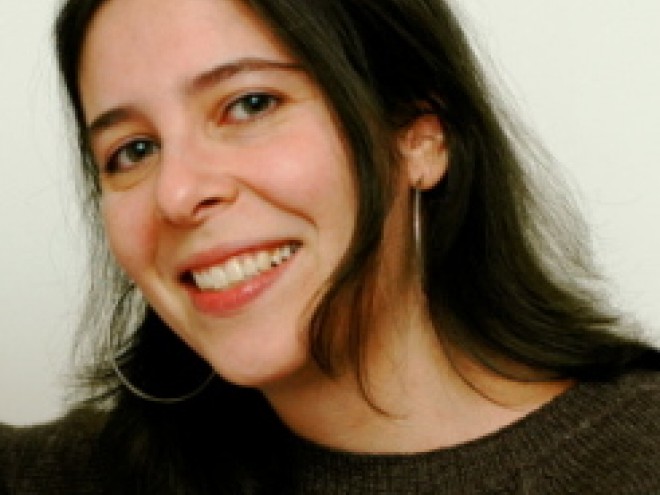
Guided Tour
The aliens’ spaceship arrived every Thursday. Meron would wait for them next to the ruins of what used to be Ramat Gan City Hall, with a cooler in tow. They always came in groups of four, or five if you counted the hovering robot who seemed to be their guide. Meron had a regular itinerary: first he took them to see the Great Synagogue that had remained almost intact, then they made their way to Ramat Gan Stadium, which had long ago turned into a swamp, and finally he led them to the wreckage of Ramat Gan Theater. That was where, a few months after they’d started going out, he and Rona had seen Romeo and Juliet. Standing by the pile of rubble that used to be the theater, he told the aliens the story of the infatuated pair who were so desperately in love that they preferred dying together to living alone. After his romantic monologue, Meron would open the cooler and hand out the ice pops that he and Rona looted from the grocery store near Oasis Cinema, where they’d worked before the disaster. The aliens would suck the ice pops curiously, and since their body temperature was much lower than the half-melted treats, all it took was one touch of their tongues for them to completely freeze back over.
After the tour, the robot always gave Meron a tiny metal box containing a handful of what Rona had begun calling “health pearls.” They never figured out why the aliens needed the health pearls, but their effect on humans was incredible: swallowing just a single pearl would make you feel full, healthy, and not at all depressed for a whole week. It was a win-win: the aliens got a heartfelt, personalized tour led by a near-extinct life-form, and Meron and Rona, the last human beings in the universe, got enough health pearls to survive until the next group’s visit.
Rona never met the aliens. If it were up to her, she would have joined Meron, but he was adamant, and so every time they landed, she ducked into the hideout they’d set up in the public library’s basement. The robot and the tourists were always well behaved, and Meron never felt in any danger, but nevertheless, he thought it would be safer if the aliens believed he was the only person left on Earth and did not find out about Rona. When he gave his spiels about the different sites, he never so much as hinted at her existence, except perhaps when he delivered his monologue about Romeo and Juliet and their overpowering love. Although he didn’t mention her by name, he felt Rona’s presence in every single word.
Rona died from a rusty nail. The health pearls that offered protection from so many ills turned out to be powerless against tetanus. And so, after surviving a meteorite fall, two hurricanes, one tsunami, and the most catastrophic series of earthquakes ever to hit the planet, Rona ultimately succumbed to a disease for which humans had developed a vaccine more than a century ago.
When she got ill, he’d desperately insisted that she take all the health pearls they had left, but now, as he slumped on the bench, he wished he’d kept one for himself.
Meron buried her next to the bench where they’d first kissed, in King David Park. When she got ill, he’d desperately insisted that she take all the health pearls they had left, but now, as he slumped on the bench, he wished he’d kept one for himself. He wasn’t sure exactly what he had, but he was burning up with fever and all his muscles ached. “Maybe this is the end,” he thought as he lay sweating on the bench near the fresh grave, and shut his eyes. Maybe it was like Romeo and Juliet: if he and Rona couldn’t live together, at least they would die together.
When he woke up, Meron saw the robot hovering above him, and he could feel a small group of aliens looking at him from behind. He must have been in such a deep sleep that he hadn’t heard the spaceship land. He was very weak, but he knew that the only way he could survive was to get more health pearls, and the only way he could do that was to give the tour. He got up and made his way heavily toward the synagogue. The tour took longer than usual, mostly because Meron had to do everything very slowly and he passed out twice. When they finally reached the theater ruins and Meron held out his hand to the robot, instead of placing the cool metal box in Meron’s palm, the robot emitted a dissatisfied whistle. Meron shrugged his shoulders uncomprehendingly and kept his hand outstretched. The robot responded with another whistle, this time at a frequency so high that it hurt Meron’s ears. He knew that as far as the robot was concerned, the tour wasn’t over until Meron told the story of Romeo and Juliet, the pair so in love that they saw no point in living without each other. He sighed and told the story.
Only after the spaceship took off did Meron allow himself to open the metal box and put a pearl in his mouth. His fever broke almost immediately, and by the time he got back to King David Park, his aches and pains had vanished. He looked at the grave. He and Rona had always thought the aliens traveled from the other side of the Milky Way because they wanted to see the Great Synagogue and enjoy a frozen treat on a stick. But that wasn’t it. They didn’t fly across all those light-years for that. The reason they kept coming back was to hear Meron stand at the ruins of the theater and tell the story of true love and of a race so rare, so sensitive, so unselfish, that it would not hesitate to choose death over heartbreak and loneliness.
Sondra Silverston has translated the work of Israeli fiction writers such as Etgar Keret, Ayelet Gundar-Goshen, Zeruya Shalev, and Savyon Liebrecht. Her translation of Amos Oz’s Between Friends won the National Jewish Book Award for fiction in 2013. Born in the United States, she has lived in Israel since 1970.



